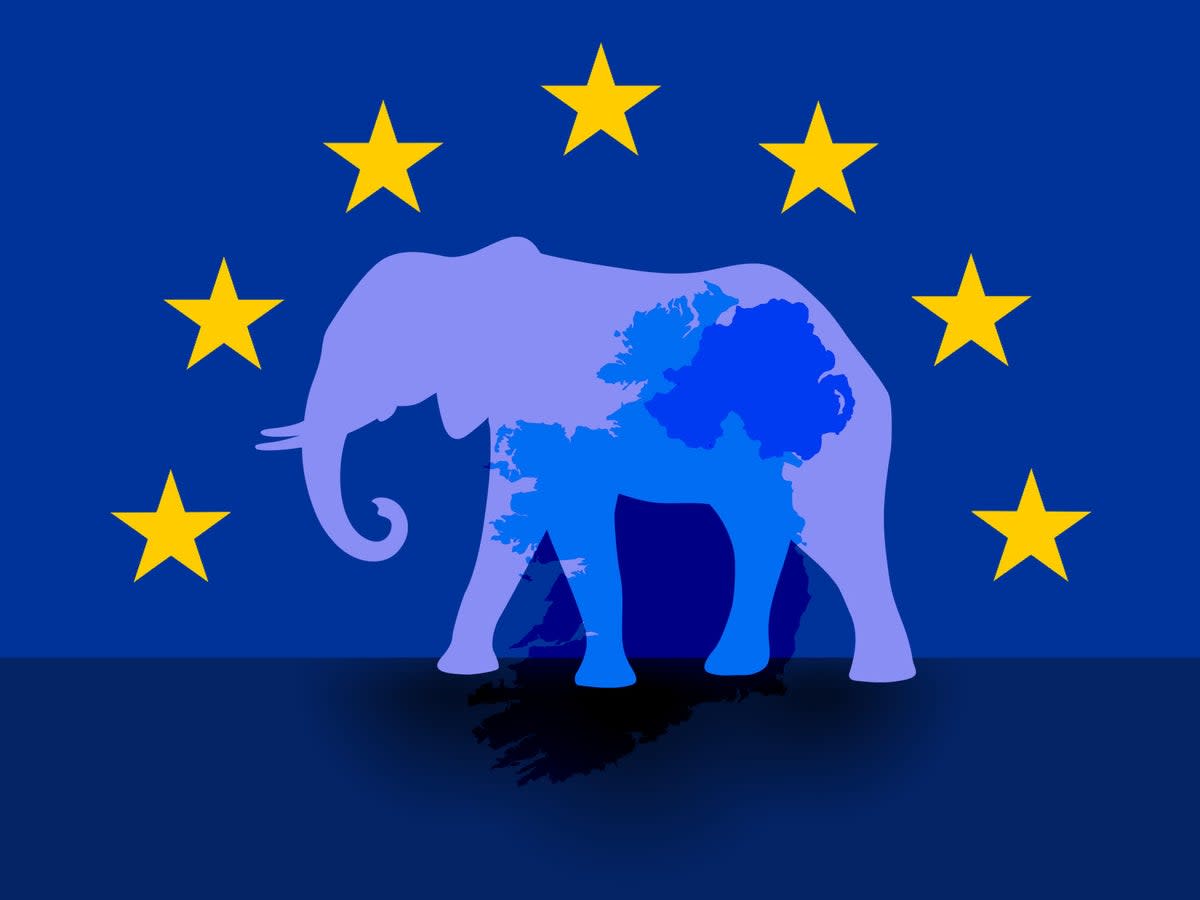Voices: Neither Labour nor the Conservatives will face up to the truth of Brexit

On Monday 14 January 2019, the House of Commons debated Theresa May’s proposed deal to leave the EU. Hansard shows the word “Brexit” was mentioned in the Chamber 165 times that day. Fast forward almost four years, and on 24 October 2022, ardent Brexiteer Rishi Sunak was announced by the Tory party as the next prime minister, in a seemingly unrecognisable country.
Two more prime ministers have come and gone, the pound crashed after a catastrophic mini-Budget and a cost of living scandal is sweeping the nation. How many mentions of Brexit on that particular Monday? Two.
Brexit seemed like the only word on people’s lips before the last general election back in 2019 – yet now, when the country is at breaking point, Westminster politicians are failing to join the blindingly obvious dots. Brexit has become the gigantic elephant in the room, trampling over our economy, society and environment to its heart’s content.
In Northern Ireland – where, in the words of Fintan O’Toole, “the detritus of British politics... washes up and lingers” – politicians don’t have the luxury of ignoring Brexit. With the DUP refusing to turn up to Stormont until the protocol has been removed from the negotiated Brexit deal, its entire government has ground to a shuddering halt.
The Northern Ireland Protocol Bill, proposed by the former prime minister Liz Truss but not yet undone by her successor, would in its current form rip up a treaty which the government (in which Sunak himself played a leading role) negotiated. It would flout the international law which our ministers assert countries must abide by and seize power from a parliament which his Brexiteer colleagues always claimed was sovereign.
The protocol is by no means perfect. But it has, until now, helped to preserve peace in Northern Ireland, maintain diplomatic relations with our nearest neighbour at a time of war and mitigate against some of the worst effects of a hard Brexit to which this government signed us up.
And this is because many of the crises we face today have been exacerbated not by the protocol, as the DUP and other right-wing Conservatives would have you believe – but by Brexit itself. The cross-party UK Trade and Business Commission, of which I am a member, found on a recent visit to Northern Ireland that new costs and regulatory complexity as a result of Brexit will mean that whole product lines and business models there could now become unviable.
And the steep economic costs businesses are facing aren’t limited to Northern Ireland. It’s delivered 15 per cent less trade, stalling business investment, a 4 per cent reduction in productivity, lower wages, trade deals which even the cabinet ministers who negotiated them are now openly tearing to shreds, increased food prices, the highest inflation in the G7, and a grave shortage of health and social care workers – and we’re barely two years into our “deal”.
People voted to leave for a myriad of reasons – some were furious the game is rigged, some felt the status quo is failing far too many of us. And they’re right – our society feels divided, unequal and powerless. But Brexit hasn’t solved those issues, it’s worsened them.
So Keir Starmer’s meaningless platitude of “make Brexit work” simply won’t cut it. Pretending that Brexit can be positive is dishonest, playing into the hands of the government, and undermining our national interest. We have to admit that this is about damage limitation now.
No wonder that YouGov’s tracker recently found a record low number of people (32 per cent) saying that, on reflection, the decision to leave was the right one, versus 56 per cent saying Brexit was a bad idea. This margin is clear; it seems the six years since the referendum have convinced people working with Europe is more beneficial than working against it.
To keep up to speed with all the latest opinions and comment, sign up to our free weekly Voices Dispatches newsletter by clicking here
And this is why the Greens agreed at our most recent party conference that we would seek to rejoin the EU as soon as the political situation is favourable, and the right terms are available. This isn’t something that’s going to happen immediately – and so there are measures we must take in the short term.
That means implementing the protocol in full, by building the necessary infrastructure for performing sanitary and phytosanitary (SPS) controls. It means rejoining the customs union to help undo the worst impacts of Brexit. It means signing up to a comprehensive agreement with the EU to protect human, animal and plant life. It means a speedy return to free movement of people between the UK and the EU, and returning to the Horizon Research programme.
And it means mirroring, rather than diluting, EU legislation that maintains high standards on workers’ rights and health and safety.
The sooner Rishi Sunak and all our politicians mention the B-word – and at least acknowledge, admit and accept the havoc it has already wreaked – the sooner we can get on with undoing both the immediate and long-term damage. If they don’t, the elephant will keep on trampling.
Caroline Lucas is the Green Party MP for Brighton Pavilion

 Yahoo News
Yahoo News 
